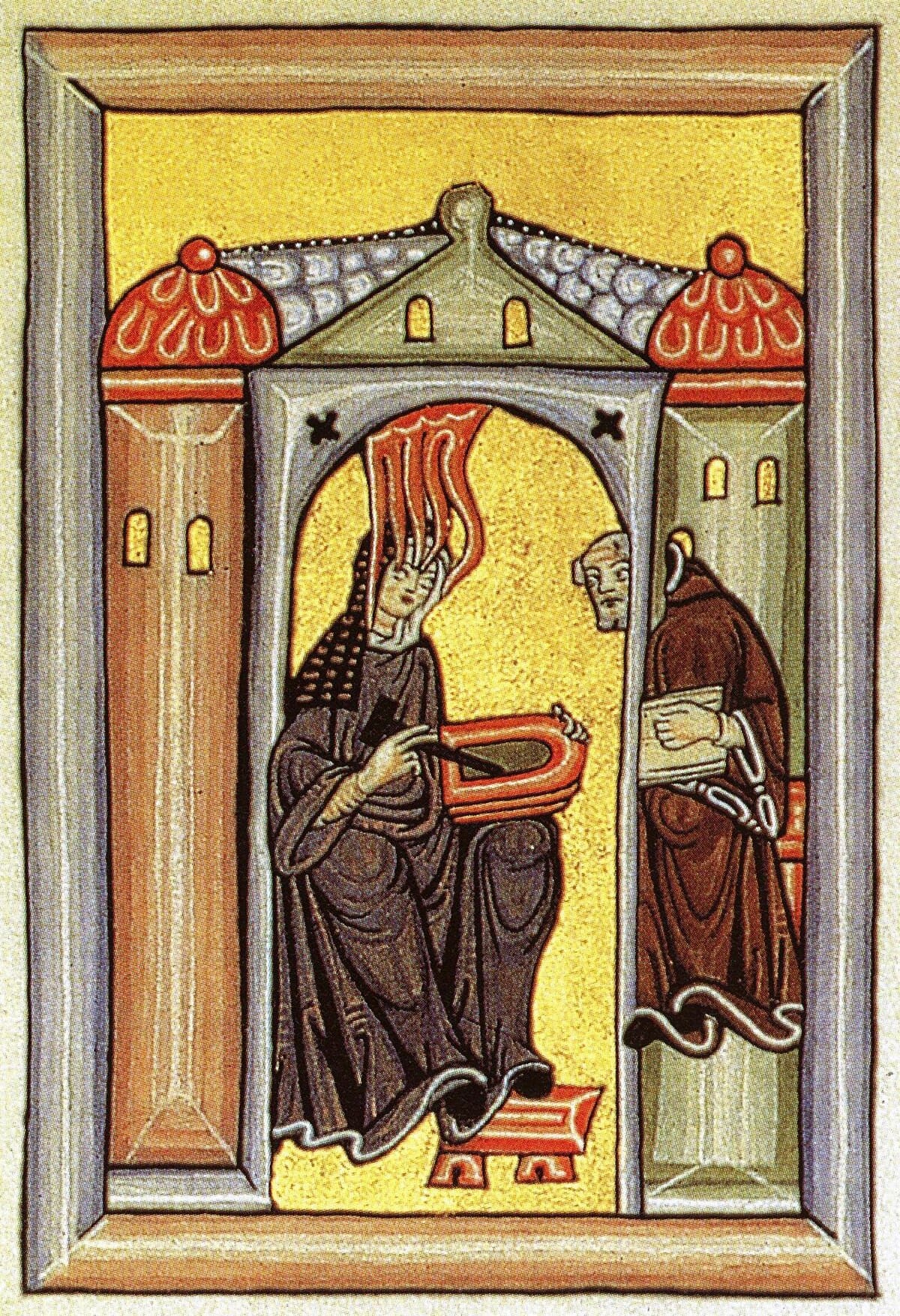
Hildegard of Bingen
Hildegard of Bingen (German: Hildegard von Bingen, pronounced [ˈhɪldəɡaʁt fɔn ˈbɪŋən]; Latin: Hildegardis Bingensis; c. 1098 – 17 September 1179), also known as Saint Hildegard and the Sibyl of the Rhine, was a German Benedictine abbess and polymath active as a writer, composer, philosopher, mystic, visionary, and as a medical writer and practitioner during the High Middle Ages. She is one of the best-known composers of sacred monophony, as well as the most recorded in modern history. She has been considered by a number of scholars to be the founder of scientific natural history in Germany.
Hildegard’s convent at Disibodenberg elected her as magistra (mother superior) in 1136. She founded the monasteries of Rupertsberg in 1150 and Eibingen in 1165. Hildegard wrote theological, botanical, and medicinal works, as well as letters, hymns, and antiphons for the liturgy. She wrote poems, and supervised miniature illuminations in the Rupertsberg manuscript of her first work, Scivias. There are more surviving chants by Hildegard than by any other composer from the entire Middle Ages, and she is one of the few known composers to have written both the music and the words. One of her works, the Ordo Virtutum, is an early example of liturgical drama and arguably the oldest surviving morality play. She is noted for the invention of a constructed language known as Lingua Ignota.
Although the history of her formal canonization is complicated, regional calendars of the Roman Catholic Church have listed her as a saint for centuries. On 10 May 2012, Pope Benedict XVI extended the liturgical cult of Hildegard to the entire Catholic Church in a process known as “equivalent canonization”. On 7 October 2012, he named her a Doctor of the Church, in recognition of “her holiness of life and the originality of her teaching.”
More Details
- Other Names :Bingen ê Hildegard,Bingeni Szent Hildegárd,Bingenli Hildegard,Bingenlik Hildegard,Binqenli Hildeqard,Hildegard Bingeniläine,Hildegard Bingeniläinen,Hildegard Bingenist,Hildegard af Bingen,Hildegard av Bingen,Hildegard de Bingen,Hildegard fan Bingen,Hildegard han Bingen,Hildegard iz Bingena,Hildegard ng Bingen,Hildegard od Bingena,Hildegard of Bingen,Hildegard van Bingen,Hildegard vo Binge,Hildegard von Bingen,Hildegard vu Bingen,Hildegard xứ Bingen,Hildegarda Bingenietė,Hildegarda de Bingen,Hildegarda iz Bingna,Hildegarda wa Bingen,Hildegarda z Bingen,Hildegarda z Bingenu,Hildegarde de Bingen,Hildegarde no Bingenas,Hildegardis Bingensis,Ildegarda de Bingen,Ildegarda di Bingen,Χίλντεγκαρντ του Μπίνγκεν,Гільдеґарда Бінгенська,Гільдэгарда Бінгенская,Хилдегард от Бинген,Хилдегарда Бингенска,Хильдегард Бингенская,Хильдегарда Бингенская,Хільдэгарда Бінгенская,Հիլդեգարդ Բինգենցի,הילדגרד מבינגן,د بنګن هلډګارډ,هايدجارد بنجين,هايدغارد بنجين,هیلدقارد بینقنی,هیلدگارد از بینگن,बिंगेनया हिल्डेगार्ड,हिल्डेगार्ड ऑफ बिन्जेन,বিঙেনের হিলডেগার্ড,பிங்கெனின் ஹில்டெகார்ட்,ഹിൽഡെഗാർഡ് വോൺ ബിൻജെൻ,ฮิลเดการ์ด ฟอน บิงเงน,ჰილდეგარდ ბინგენელი,ヒルデガルト・フォン・ビンゲン,宾根的希尔德加德,希尔德加德·冯·宾根,聖賀德佳,힐데가르트 폰 빙겐
- WikiPedia Page
- Country : Electoral Palatinate, Holy Roman Empire
- Born on 17 September